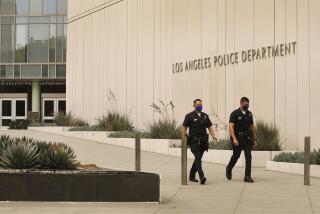Inglewood sues resident over YouTube videos using council footage to bash mayor
The documentary-style videos that Joseph Teixeira has posted on YouTube under the name “Dehol Truth” are not flattering to Inglewood Mayor James T. Butts Jr.
One opens with the mayor boasting at a City Council meeting about Inglewood’s efforts to improve traffic flow around the Forum. Pivoting quickly from the meeting, the video hammers away at the mayor’s assertions using voice-over, on-screen text and footage of drivers running red lights while pedestrians try to use crosswalks.
Other videos also use snippets of council meetings to lambaste Butts.
In response, Inglewood has filed a federal lawsuit alleging that the online video posts violate the copyright of council videos — a tactic some legal scholars say is unusual, unlikely to succeed and fraught with financial risk for the small city that is set to break ground on a $1.86-billion NFL stadium.
The legal wrangling over the videos began in November, when Teixeira received a cease-and-desist order from Inglewood attorneys threatening to sue if he kept the videos online. The 54-year-old self-styled watchdog and Inglewood resident refused to take down the videos, so the city set aside $50,000 for legal fees and in March filed suit, saying Teixeira’s videos have caused it “irreplaceable harm and damages.”
The city is seeking unspecified “actual damages stemming from the defendant’s unauthorized exploitation of the city’s copyrighted videos,” according to the nine-page complaint filed by Inglewood’s attorney, JoAnna M. Esty, in U.S. District Court for the Central District of California.
Such lawsuits are rare because under California public records law governments generally cannot claim ownership of public documents. Even if Inglewood could copyright its meeting videos, fair-use law grants broad rights to use copyrighted material without permission, said Eugene Volokh, a law professor at UCLA Law School.
“When you are taking somebody else’s material, not just to reproduce it but to comment on it and criticize it and sometimes to parody it … that is generally fair use,” Volokh said.
Jessica Levinson, a clinical law professor at Loyola Law School, questions the suit’s merits. “It looks like the city is using taxpayers funds to try to insulate itself from criticism,” she said.
Experts note that in copyright cases, judges often order the loser to pay the winner’s attorney fees, which could increase the cost to taxpayers.
In late June, Dan Laidman, who is representing Teixeira pro bono, argued to have the case dismissed. Both parties are waiting for federal Judge Michael Fitzgerald to issue a ruling.
Butts, who previously served as Inglewood’s police chief, would not comment, citing the litigation.
The lawsuit comes as the city faces criticism for taking shortcuts in its quest to lure an NFL team.
The five-member City Council skipped a public vote and adopted a ballot measure in February to add a 80,000-seat stadium to its Hollywood Park plan, six weeks after the project was unveiled. Developers, which include St. Louis Rams owner Stan Kroenke, also were able to bypass state-mandated environmental impact reports.
With a population of 110,000 and a general fund budget of about $86 million, Inglewood has its share of gadflies. But some residents say the role of these critics has become more important in recent years as the once-fractious City Council has grown harmonious.
Butts lent tens of thousands of dollars to two councilmen to help get them elected in 2011. The other two were already political allies. With all the officials aligned in their thinking, some residents worry there’s nobody on the council to offer alternate viewpoints or hold officials accountable.
That’s where Teixeira, who says he works in healthcare, stepped in.
In 2011, he attended his first City Council meeting after he witnessed a drive-by shooting. He said he reported the crime, but the Inglewood Police Department failed to investigate. So he brought his concerns to the City Council and filed a Public Records Act request to obtain copies of his 911 calls.
Teixeira said he was stonewalled and sometimes ejected from the weekly meetings. He said the police chief initially denied the tape existed. Nine months later, Teixeira received copies of the recordings.
“If I take these tapes, and I compare them to what they’re saying in the video of the meetings, it would be clear that they are blatantly lying,” he said. “That’s when I started thinking about making videos.... I’ve got the time, so I’m just going to start documenting this.”
NEWSLETTER: Get the day’s top headlines from Times Editor Davan Maharaj >>
Using his MacBook laptop, the rookie producer taught himself to upload the meeting videos to iMovie and add text and narration. He started distributing DVDs at no charge. Later, he posted his work to YouTube. The City Council often rebutted his claims during their meetings. That gave Teixeira content for more videos.
Teixeira said he does not have political aspirations but wants Inglewood residents to know what their elected officials are doing.
“I have a purpose for the videos, which is to document what is going on because people have a short attention span and don’t do a lot of research,” he said. “I try to be fair. Most of it is negative, but I don’t exaggerate and I try not to skew things. I pick the things that are obvious, that are clearly evident, and it’s by their very nature that they are damning.”
Teixeira has taken a hiatus from moviemaking as he awaits the judge’s ruling.
Twitter: @AngelJennings
ALSO
Some college students on financial aid don’t get it in time to pay fees
‘Giving circles’ plant seeds of philanthropy in Asian American communities
Paid $1 to $3 a day, unauthorized immigrants keep family detention centers running
More to Read
Sign up for Essential California
The most important California stories and recommendations in your inbox every morning.
You may occasionally receive promotional content from the Los Angeles Times.







